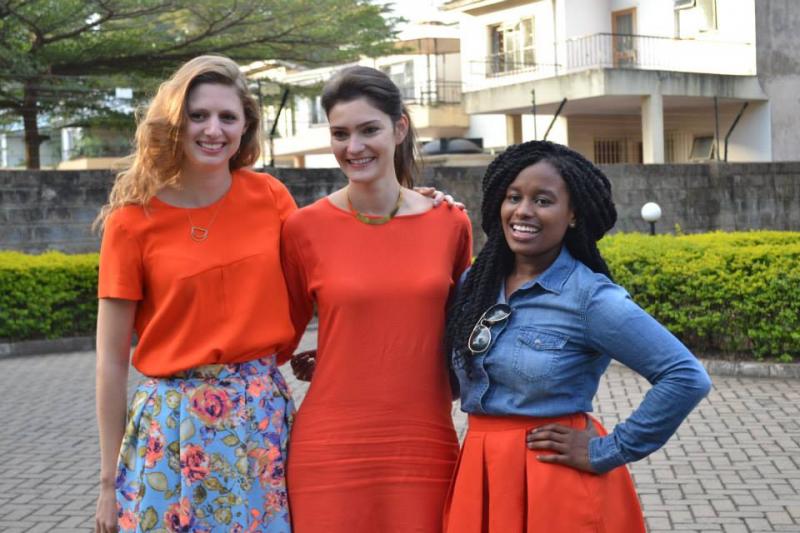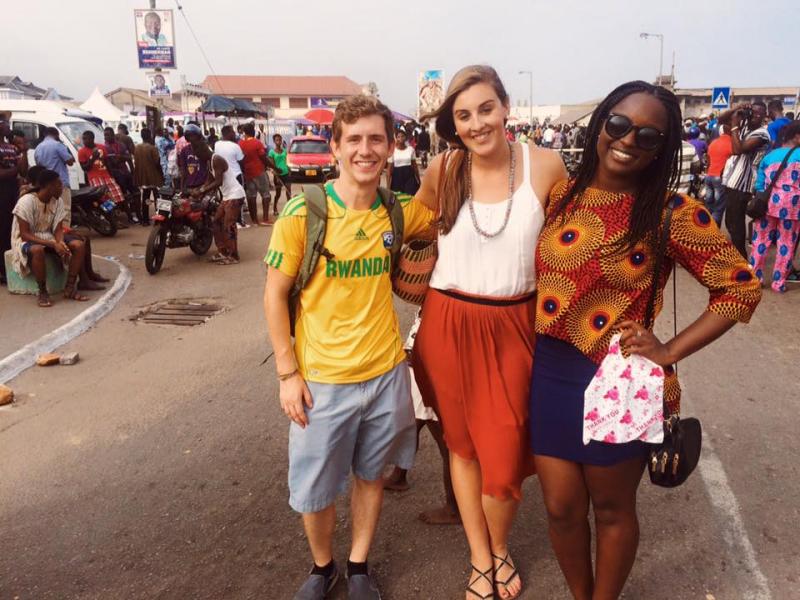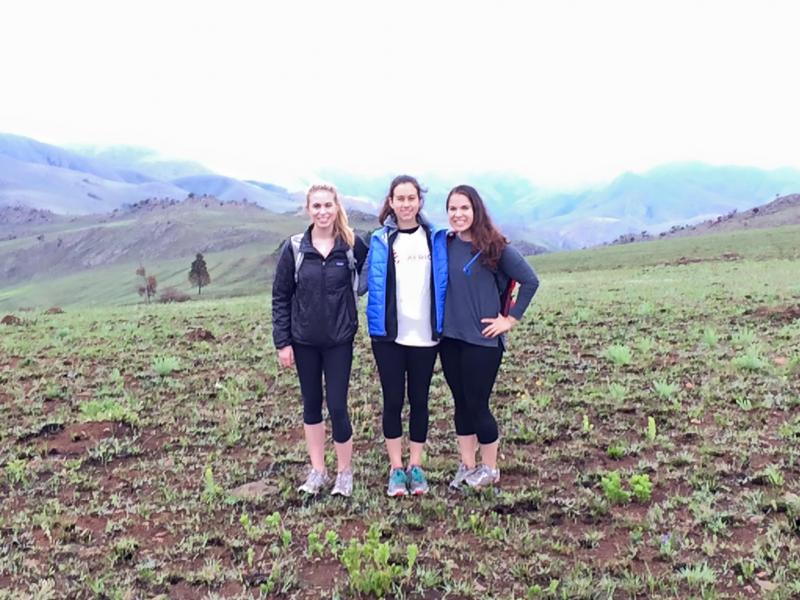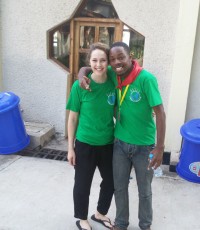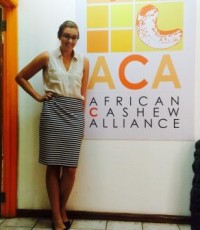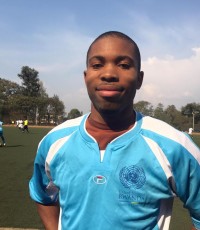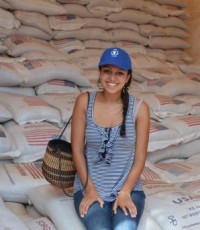September - October 2015
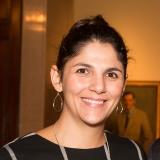
Dear Friends,
I am delighted to introduce myself as the new Executive Director of Princeton in Africa. As we enter our fellowship application season for the upcoming 2016-17 fellowship year (our application deadline is this Sunday, November 1st at 11:59PM EST!), I am excited to begin the process of selecting a new class of bright, talented, and inspiring young leaders dedicated to the advancement of the African continent.
With this edition of the Fellows Flyer, we’re introducing a new component of the Flyer: a rotating fellowship organization/alumni/supporter profile to highlight the important contributions made by these individuals and organizations to Princeton in Africa and to the advancement of the African continent. Our first profile is of Village Enterprise, a fantastic organization with whom we’ve placed Fellows since 2013.
We hope you enjoy this edition of the Fellows Flyer!
Warm regards from Princeton,
Jodianna Ringel
Executive Director
PiAf Connections
Please click below to check out pictures of our Fellows, Alums and other members of the PiAf family meeting up at home and around Africa.
Notes from the Field
By Meghan Casey, 2015-16 Fellow with Baylor International Pediatric AIDS Initiative in Tanzania
“SHAP SHAP?” “SHAPISH!” This attention-gathering Swahili phrase was the chorus of my first week at Baylor Mwanza. Running around throwing water balloons, dancing after each and every meal, playing HIV jeopardy, and becoming perhaps too attached to finishing our friendship bracelets were just a few of the experiences that made up my week at Camp Matumaini, a program for 10-13 year olds that focuses on medication adherence, teamwork, and self-esteem. Leaving the retreat center, I felt both absolutely exhausted and exhilarated. I couldn’t wait to get back to work that Monday, feeling a newfound sense of friendship that could only be gained through seeing your co-workers dress up in newspaper clothing.
From that first week, I’ve witnessed that Baylor Mwanza is truly exceptional in the care that it provides, allowing patients to see doctors, social workers, counselors, pharmacists, and nutritionists all in one building. My job as Social Program and Medical Education Coordinator essentially translates to having the opportunity to work with almost every person at Baylor, whether trainees who are arriving or patients who are participating in our programs or staff who are involved in planning and implementation. These people and their constant dedication to creating better futures for themselves and those around them are what inspire me every day. Staff and patients are a “Baylor family,” and I’ve felt so fortunate to become a part of that. As my favorite part of being a Fellow so far has been the people who make up Baylor, I thought it was best to bring this Flyer to them. I walked around to various staff and teens, asking them the following question: “What is your favorite thing about Baylor and why?”
Here are some of the responses:
“I can learn new things daily.”
“People are caring.”
“I meet all my friends.”
“We learn about different topics all the time, like how to take our medicine properly.”
“The educational services given by our counselors and also at Teen Club.”
“Service to our clients is the best.”
“We are a family.”
All of the things said above capture Baylor: a place where quality of care is never compromised, where learning is a part of daily life for everyone passing through the doors, and where friendship gives hope and happiness even during the toughest of times. Although I may not be running around every day like I was at camp, the joy that I gained in that first week has never left — I have a feeling it’s here to stay.
Notes from the Field
By Zara Riaz, 2015-16 Fellow with African School of Economics in Benin
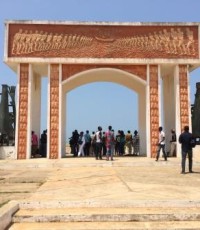
Zara and fellow Fellow Sol Eskenazi visited the “Gate of No Return” in Ouidah, Benin, a former slave-trading post.
After four years as a college student, experiencing the university setting from an administrative perspective has been interesting, to say the least. I have only been working at the African School of Economics in Abomey-Calavi for a little over a month, but I have already had the chance to work with multiple departments within the institution. With the start of the semester rapidly approaching, my co-Fellow, Sol Eskenazi, and I have been busy designing class schedules, helping prepare and finalize students’ financial aid packages, and assisting with an English class for incoming students from Francophone countries.
Outside the realm of academic affairs, we have been working with one of ASE’s research institutions, the Institute for Empirical Research in Political Economy (IERPE). In mid-July, IERPE hosted the Afrobarometer Summer School, a conference where researchers from across West Africa convened for three weeks to participate in an intensive training course that covered topics such as research design, social statistics, parties and elections in Africa, and ethnicity and government. In addition to attending various outings and sessions during this conference, we have also had the opportunity to assist Professor Léonard Wantchekon, Professor at Princeton University and founder of ASE, with a proposal for a research project studying the effects of demand-side education inputs such as motivation and parental involvement on education outcomes in schools in Nigeria. In upcoming weeks, Sol and I will be delving more deeply into IERPE’s ongoing research projects, which include studies on education, human capital, and social mobility, emergency health care, and electoral field experiments in Benin.
While research and academic affairs have kept us quite busy over the last few weeks, we are also making time to explore Cotonou and surrounding areas. A few weeks ago, we visited Ouidah, a city on the coast of Benin known for its central role in the slave trade. Ouidah is also regarded as the birthplace of Voodoo and home to the country’s well-known Voodoo python temple. When we’re not wrapping pythons around our necks, we often head to the beach to kayak or to simply take in the beauty of Benin’s coast, often indulging in cold, freshly made glasses of pineapple juice along the way.
Notes from the Field
By Monique St. Jarre, 2015-16 Fellow with African Cashew Alliance in Ghana
After almost three months in Ghana, my attempts to learn the local language have been mostly unsuccessful. Despite our office security guard’s full efforts to teach me every day and the many taxi drivers who roll their eyes at my foreignness, the unfamiliar nuances of the language just will not stick in my head. So I thought, what better time than now, to give it another try. These words, difficult as they are to remember, reflect the diversity of my experiences so far.
Twi – spoken by over 50% of Ghanaians
Akwaaba – Welcome
From my first steps into the airport to my coworker’s daily invitation for lunch, this is a word I have become very familiar with. For me, it symbolizes the incredible openness and warmth that I have experienced since that first day. Ghana’s culture is eager to embrace you and it is noticeable in every interaction.
Wonhim hᴐ? Charlie, Te so – Do you know the place? Friend, reduce the price
The lack of street signs and constantly evolving skyline mean that getting around is initially incomprehensible – how in the world am I supposed to get somewhere if the taxi doesn’t know it and I don’t know it?! Slowly, you learn the right markers, you describe every place as being “just next to that other place” and you know the right price to bargain for. You begin to feel like an insider.
Aborᴐbԑ, kwadu, kube – Pineapple, banana, coconut
The fresh fruit here is just incredible. On every street corner, overflowing in markets, and available whenever you please, Ghana is full of delicious, tropical fruits that seem so exotic back home.
Ahuhuro – Hot, sticky weather
You can say that twice. And then say it again. As a New England native, the tropical humidity of the equator has been quite a shock. While the constant sweating will never be ok in my book, there is something to be said about beach weather all year round.
Bisebisa – To keep asking
This may be the unofficial mantra of my work life. I entered a fantastic organization, the African Cashew Alliance, with a team who gave me a lot of responsibility right away and expected me to run with it. I have found that constantly asking questions, seeking help, and accepting the challenges of learning, has been my most valuable resource.
Nketenkete – Little by little
This is ultimately what it all comes down to. Integrating into a new place, a new job, and a new life can only be done one day at a time. I find myself changing and growing little by little, day by day, in ways that I never could have anticipated.
This journey, like learning a new language (have I mentioned that I’m attempting French as well…) is inevitably challenging and exhausting. Yet, at the end of it all, I think I will find that it was also rewarding, fulfilling, and undoubtedly worth it. So, Afe nkᴐ mmԑto yԑn bio (May the year go and come to meet us again).
Notes from the Field
By Malcolm Temple, 2015-16 Fellow with UN World Food Programme in Rwanda
It’s my second week in Kigali as the new Reports Officer for World Food Programme. I arrive just after intermission to cheer on my co-workers participating in the staff soccer match against the visiting WFP staff from Goma, DRC. “Malcolm!” My colleague, Colette, sees me and scurries down the bleachers. “They need you in the game!”
“That’s all right… I only came to watch… but I don’t really play soc-” Colette ignores my protest and takes my bag from my hand. “He needs a jersey,” she shouts in Kinyarwanda to one of the players coming off the field. A mildly sweaty blue jersey is thrown to me and I find myself thrust onto the field.
As an avid swimmer and occasional basketball player, I’ve never been skilled at soccer. It doesn’t help when I quickly discern this game is much more than a lighthearted team-building activity — it’s an intense battle. A part of me hopes my presence on the field goes unnoticed and nobody passes me the ball. But after several minutes of darting back and forth with my best impression of invisibility, the ball is sent in my direction.
With the feeble dexterity of my feet failing me, the ball is swiftly snatched from my possession by one of my opponents and passed. He then launches the ball into the goal and the game is over. I’m mortified. But I’m quickly relieved when I learn the Rwandan team was up 6 points and we won 8 to 2! Afterward, both teams meet at a local pub to relax over beers and brochette.
Jumping in the game
Since my arrival in Rwanda, soccer isn’t the only thing I’ve found myself thrown into. To get up to speed with my new teammates at WFP, I’ve had to quickly grasp food security in the complex context of Rwanda, in addition to the many components that go into running and assessing programs to eradicate hunger. This has meant occasionally sitting on the sideline to simply listen and learn from my colleagues, but also being ready when the ball is sent my way.
I’ve had the opportunity to attend meetings at the UN High Commissioner for Refugees office to address the Burundian refugee crisis in Rwanda, as well as edit extensive documents on project strategies and participate in a workshop on Saemaul Undong, the Korean model of rural poverty eradication based on self-help.
At times, the quick learning curve has felt like trying to maneuver a ball with my feet. But my fellowship experience has been fascinating and incredibly insightful. Of course, having excellent coaches at my disposal at WFP has made all the difference.
Notes from the Field
By Olivia Woldemikael, 2015-16 Fellow with UN World Food Programme in Uganda
Before moving to Kampala, Uganda to work at the World Food Programme, I was repeatedly advised to relax a bit and take it down a notch since things would run on a more relaxed pace of life that some even refer to as “African time.” Coming from an Ivy-League school, it has been intriguing to compare the work ethic around me with my former peers’ perception of the African work ethic. Americans at home have told me, “I work hard” and “I work smart” as if that were not the case in African countries. In learning more about my surroundings in Kampala, I have been challenged to think critically about the “I work hard” and “I work smart” mentality every day.
Every time I’ve walked the 45-minute walk to work in the morning (read: very rarely), I leave the sleepy compound of my shared, international house to see the slum neighborhood surrounding it awake and bustling. Outside the mosque, a few men in long, white thobes linger after the morning prayers, and across the street, shack-like stalls display their vegetable selection for the day. Along the road, stands of young men drip oil onto a sizzling stove ready to make rolex (rolled eggs in chapati) – for a heavy, Ugandan breakfast. As I walk further down the hill, I pass an improvised restaurant, which bills itself as an internet café, followed by an assortment of makeshift businesses – one-room restaurants, barbershops, little convenience stores. The whole neighborhood is awake in full motion and the soundtrack is the putter-putter of the boda bodas, Kampala’s notorious motorcycle taxis. They zip past me taking people to work or call out to me asking if I need a ride. Within the stretch of my hill, I pass tens of small entrepreneurs taking full advantage of the limited resources they have access to.
When I’ve traveled for my work with the World Food Programme, the work ethic of Ugandans is even more astounding. In the most remote corner of the country where food is difficult to find and even more difficult to grow, adolescent girls carry thick bundles of wood, while women of all ages load 100 pound sacks of food onto their heads and carry them back to villages miles away. Sometimes, the line, “I work hard” pops into my head. Each object that in America is single-use can have a new lease on life here in Uganda. Old tires are reborn as sandals, the plastic rings around bottle caps (or what I normally think of as the annoyances while opening a soda) are transmuted into bracelets and beads, and even the plastic WFP food sacs are cleaned and resold at the market. As I look on at these transformations, the words, “I work smart” ring in my ears and fall flat against the backdrop of these hard-working, enterprising people who receive so little in exchange for their efforts.
Notes from the Field
Fellowship Organization Profile: Village Enterprise (written by Kate Reott, 2014-15 Fellow and now Program Manager with Village Enterprise in Kenya/Uganda)
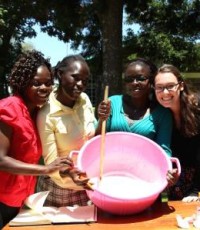
Village Enterprise staff members (Kate is pictured on the far right) are all smiles while developing a soap making training as part of a vocational skills pilot.
In June 2014, Kate Reott stepped off a plane at Jomo Kenyatta International Airport to begin her Princeton in Africa fellowship at Village Enterprise in rural Kenya and Uganda. After an exciting and formative fellowship year, Kate now works as a Program Manager at Village Enterprise, continuing her education in microenterprise development, rural poverty, and personal growth.
—-
Village Enterprise (VE) became a Princeton in Africa (PiAf) fellowship organization in 2013, so I was only the second PiAf Fellow at VE when I arrived in June of 2014. I quickly realized that VE is exactly the type of organization PiAf spoke about at our orientation: innovative, impactful, and ready to give me a lot of hands-on experience.
The Village Enterprise mission is simple: to equip people living in extreme poverty with the resources to start sustainable businesses. Village Enterprise was founded in 1987 but began implementing its current program model in 2011 when the organization hired full-time local staff and developed a robust Monitoring and Evaluation (M&E) process that is now integrated into every stage of the program. Through community-level discussions and household-level surveys, Village Enterprise identifies the poorest families of a village to participate in the program (i.e., living on $1.25/day or less). Village Enterprise provides business and financial literacy training, seed capital grants, and ongoing business mentoring, enabling program participants to start successful microenterprises, like chicken businesses or small retail kiosks. VE also facilitates the creation of Business Savings Groups (BSG) among program participants from the same community. The BSG acts as a source of financial capital for business expansion or diversification, but also as a support community of microenterprise business owners who advise and mentor each other long after they have exited the twelve month Village Enterprise program.
During my fellowship, I came to appreciate a few key features of Village Enterprise that, when the time came, made it an easy choice to stay on as a Program Manager. First, the VE field team is 95% East African. This affords me incredible opportunities to learn about Kenya and Uganda from Kenyans and Ugandans and pushes me every day to reach across the cultural divide, while also having to learn my own cultural biases and blinders. Secondly, Village Enterprise strongly emphasizes assessment, learning, and innovation amongst the staff. During my fellowship, I worked with our M&E team to improve our field-to-office feedback loops and launch a qualitative evaluation technique to complement our already robust quantitative work. This year, I’m working with our Innovation Incubator to study business selection trends and build a value chain research program from scratch. All of these initiatives came to fruition because VE staff members are constantly discussing, brainstorming, and problem solving to improve our program.
Finally, the organizational and geographic distances between my work and our program participants are miniscule. As a PiAf Fellow, I designed two program pilots — and then managed their implementation in the field, witnessing the pilots in action and getting immediate feedback from our staff. This year is no different, as I’m currently in the midst of designing a multi-year study to learn about decision-making of the rural poor while also piloting vocational skills trainings. Every week, I have the opportunity to visit the homes of our program participants and see their businesses in action, teaching me more about rural poverty and microenterprise development than I could ever learn from a behind a desk.
This fiscal year, Village Enterprise projects to launch 3,240 businesses, impacting 9,720 households across Kenya and Uganda. It’s an ambitious agenda that I am honored to help execute as I continue to navigate the adventures of life in rural East Africa!


